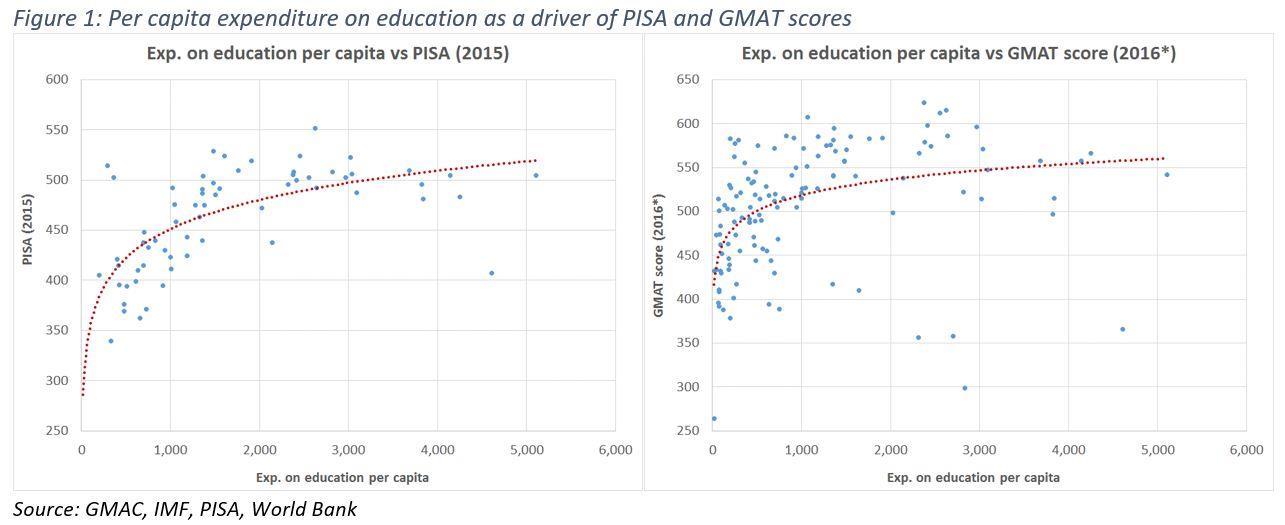By
Kai L. Chan*
In measuring performance in education or healthcare, societies often mistakenly focus on inputs rather than outcomes. That is, it is common to erroneously measure success by counting the resources devoted to it. But expenditures do not equal success. Indeed, societies would like to spend – for an equivalent outcome – as little as possible.
The United States is the global leader in dollars spent per student in tertiary education, yet its students rank 42nd globally on the GMAT, a standardised test used primarily for admission to post-graduate schooling.
There is a similar disconnect between inputs and outputs for the PISA, a test administered by the OECD to a broad sample of 15-year-old students. Luxembourg spends the most in absolute terms per student in the primary and secondary stages of education, yet ranks 32nd on the PISA. If expenditures were calibrated against the size of the economy, the global leader in education would be Botswana.
Figure 1 below shows the relationship between expenditures and results on the PISA and GMAT tests. The red line in each graph is the predicted performance based on education spending. Countries above the red line are over-performing relative to income, while those below the line are underperforming.

Table 1 below shows the ten nations whose educational outcomes most exceed statistical predictions based on education spending. The global winner is China. It achieves 209 points more on the two tests than expected.
In second place is Vietnam, a country sometimes referred to as an “education superpower” owing to its exceptional scholastic performance given its limited resources. Singapore, a rich nation, achieves great test results without outsized expenditures. Rounding out the top five are Georgia and Poland, both of which were recently under Russian/Soviet influence. Russia itself places 7th on the list.
.jpg)
China, Vietnam and Georgia seem to be the winners insomuch that they achieve results far beyond their relatively modest incomes. Poland’s performance is also exceptional given per capita income that is significantly below its OECD peers.
This begs the question: What are China, Vietnam, Georgia and Poland doing right in their educational sectors?
Insights into educational efficiency and success
Of course, some particularities unrelated to the countries’ prowess in education may partially drive these numbers. For example, China runs the PISA test only in select cities. And in Vietnam, more students drop out of the schooling system before age 15 as compared with OECD countries (14 vs. 8 percent), thus weeding out weaker students before they take the PISA test. But no matter how idiosyncratic the countries’ experiences, policymakers can learn interesting things from them.
The top rankings of China, Vietnam and Singapore might suggest the success of so-called Asian parenting techniques as described in Amy Chua’s book, Battle Hymn of the Tiger Mother, or the role of Confucian values that place a premium on filial piety and education. However, the presence of Poland and Georgia suggests that high achievement is not necessarily (or solely) a matter of eastern versus western values.
Indeed, in the book The Smartest Kids in the World: And How They Got That Way, author Amanda Ripley argues that the success of Poland was largely due to a series of post-communist reforms, in particular its decision to delay streaming by one year, until students reach age 16. While this required building 4000 new junior high schools to accommodate the students who would previously have gone off to vocational school, it provided an extraordinary boost to the country’s PISA results in only three years.
Save for Singapore, all top-5 countries were not too long ago under communist rule or influence (China is still nominally communist although much of its economy is now market-driven). This stunted, limited or degraded their educational outcomes in various ways.
In China, a generation of brains was wasted by the Cultural Revolution, a movement that was decidedly anti-intellectual. Large swathes of Vietnam’s intelligentsia (and human potential) fled the country as boat-people refugees when it fell under communist rule. In Poland, armed conflicts and political turmoil led to a decimation of its education capital. As for Georgia, it endured Soviet occupation for most of the 20th century.
This may mean that while poor political decisions mixed with an anti-intellectual atmosphere can spell disaster for education outcomes, latent education capital can rebound once freed.
Inclusive and sustainable growth
The biggest takeaway for policymakers should be that throwing money at a problem is not a panacea. It is more important to develop a culture of respect for education, rather than just buying new textbooks or computers. When society appreciates math Olympiads and chess just as much as professional sports, it is one sign a country’s development is on the right path. Policymakers can play an active role in promoting such an appreciation.
Governments need to supply good governance – and stay away from repressive policies – so that people can concentrate their intrinsic talents on acquiring educational capital: Those willing to work hard and play by the rules should be able to achieve a comfortable life. The challenge is to ensure inclusive and sustainable growth that fairly rewards entrepreneurialism without allowing the elite to hoard power and wealth.
Finally, the experience in Poland of delaying streaming suggests that society’s expectations affect the performance of students. PISA scores improved by about 100 points in students who were kept longer in the educational stream as opposed to being sent off to vocational training. It seems that when students are challenged, they respond: Expectations – be they high or low – are self-fulfilling prophesies.
*a Distinguished Fellow at the INSEAD Innovation & Policy Initiative
** First published in knowledge.insead.edu




 By: N. Peter Kramer
By: N. Peter Kramer
